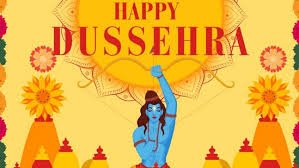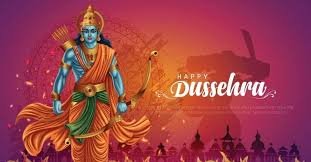Dussehra 2024: The Victory of Good Over Evil
Introduction to Dussehra
Dussehra, also known as Vijayadashami, is one of the most significant Hindu festivals celebrated across India. In 2024, Dussehra falls on October 12, marking the culmination of the nine-night festival of Navratri. This day commemorates the victory of Lord Rama over the demon king Ravana, symbolizing the triumph of good over evil. The festivities involve various cultural events, including Ramlila performances, where the epic tale of Ramayana is enacted, showcasing the virtues of righteousness.
Cultural Significance
Dussehra is a festival steeped in cultural traditions and beliefs. It brings together families and communities, emphasizing values such as justice, truth, and integrity. The burning of effigies of Ravana, Meghnath, and Kumbhkaran during the festivities signifies the eradication of evil and serves as a reminder of the consequences of wrongful actions. The festival also represents the end of the monsoon season and the arrival of winter, making it an occasion of renewal and hope.
Celebrations Across India
Celebrations of Dussehra vary across different regions of India. In northern states, large-scale Ramlila performances and processions are organized, culminating in the symbolic burning of the effigies. In southern India, the festival is celebrated with elaborate decorations and traditional rituals. In Gujarat, Garba and Dandiya dance forms are a significant part of the festivities, while in West Bengal, it coincides with the Durga Puja celebrations, honoring Goddess Durga’s victory over the buffalo demon Mahishasura.
Educational Importance of Dussehra
Dussehra also holds educational significance as it teaches moral values and the importance of standing up against injustice. Schools often organize events where students participate in Ramlila performances or debates about the festival’s themes, enhancing their understanding of ethics and morality.
Conclusion
Dussehra 2024 stands as a beacon of hope and resilience, reminding us of the eternal struggle between good and evil. It encourages individuals to embrace positive values and fight against wrongdoing in society. As the festival approaches, communities will come together to celebrate this timeless tale of victory, fostering a spirit of unity and joy.

Why This News is Important
Cultural Unity and Identity
Dussehra is a festival that fosters cultural unity among diverse communities in India. It serves as a platform for individuals to come together and celebrate shared values and traditions, reinforcing a collective identity rooted in Indian heritage. In times of social fragmentation, such festivals play a crucial role in promoting harmony and understanding.
Lessons from the Epic
The story behind Dussehra offers profound life lessons, especially for students and young adults preparing for government exams. The principles of justice, integrity, and the fight against evil resonate deeply in contemporary society. Emphasizing these values can inspire individuals to contribute positively to their communities and uphold moral standards.
Historical Relevance
The historical significance of Dussehra dates back to ancient times, making it an essential aspect of India’s cultural landscape. Understanding this history allows students to appreciate the rich traditions of their country, fostering a sense of pride and responsibility towards preserving these customs.
Motivation and Resilience
The theme of victory over adversity encapsulated in Dussehra serves as motivation for students preparing for competitive exams. It reinforces the idea that perseverance and determination can lead to success, echoing the journey of Lord Rama in overcoming challenges.
National Celebrations
As Dussehra is celebrated nationwide, it showcases the diversity of Indian culture. Understanding its importance can help students appreciate the various cultural practices within the country, enhancing their overall knowledge of India’s social fabric, which is often included in government exam syllabi.
Historical Context
Dussehra has its roots in the epic Ramayana, composed by the sage Valmiki. The festival signifies Lord Rama’s victory over Ravana, an event that symbolizes the eternal struggle between good and evil. This story not only forms the foundation of the festival but also highlights the significance of virtue, righteousness, and moral conduct. Historically, Dussehra has been celebrated for centuries, with various regions developing their own unique traditions and rituals surrounding the event. The celebration of Dussehra during different times of the year has also led to regional variations, such as the Durga Puja festival in West Bengal, which coincides with the same period, focusing on the Goddess Durga’s triumph over the buffalo demon.
Key Takeaways from Dussehra 2024
| Serial Number | Key Takeaway |
|---|---|
| 1 | Dussehra symbolizes the victory of good over evil. |
| 2 | It is celebrated on October 12, 2024, marking the end of Navratri. |
| 3 | The festival promotes cultural unity and moral values among communities. |
| 4 | Dussehra offers significant historical insights related to the Ramayana. |
| 5 | Celebrating Dussehra inspires perseverance and determination, important for students preparing for exams. |
Important FAQs for Students from this News
Q1: What is the significance of Dussehra?
A: Dussehra signifies the victory of good over evil, commemorating Lord Rama’s triumph over the demon king Ravana, as narrated in the epic Ramayana.
Q2: When is Dussehra celebrated in 2024?
A: Dussehra is celebrated on October 12, 2024.
Q3: What cultural practices are associated with Dussehra?
A: Dussehra involves various cultural practices, including Ramlila performances, the burning of effigies of Ravana, and traditional dances like Garba and Dandiya, depending on the region.
Q4: How does Dussehra contribute to moral education?
A: Dussehra teaches moral values such as justice, integrity, and resilience, which are essential for personal development and are relevant for students preparing for competitive exams.
Q5: What are the regional variations in Dussehra celebrations?
A: Celebrations of Dussehra vary across India, with different regions having unique customs, such as Durga Puja in West Bengal, Ramlila in northern states, and traditional dances in Gujarat.
Some Important Current Affairs Links

















